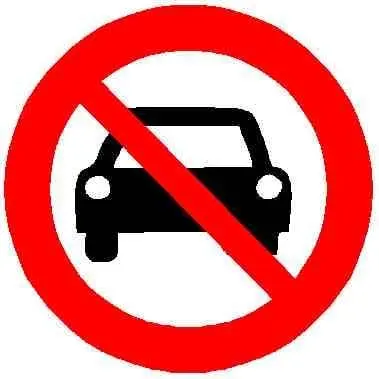It would be great to see this happen.
But I’m in the US, and in a low density suburb that’s borderline rural. I expect to be driving or using the car equivalent (robo taxies/buses that are actually good?) for the rest of my life. But I’ve set myself up to need to drive much less, which makes the driving itself more enjoyable.
Unfucking transportation is just so far down the list of things that this place needs to unfuck. Given recent history, I’ll be surprised if widespread modern efficient public transit even gets serious mainstream political discussion in my lifetime.
We don’t need to fix your suburb’s transportation if it becomes a ghost town.
If cheap high quality high density housing is built elsewhere, and property taxes are updated to reflect the actual infrastructural costs of those buildings to the government, very few people will want to live there.
Reading through these comments I’m realizing a lot of the people who are advocating for cars, because they offer greater flexibility and autonomy, aren’t taking one critical thing into consideration: cars are useless without roads, and other necessary car infrastructure. You can’t use a car to get from your home to your work without someone first paving a road between them. So, if we’re going to have to build and maintain transportation infrastructure regardless, why not build infrastructure that will facilitate moving as many people from one place to another as efficiently as possible?
Bikes/buses use roads. won’t get train station to your house.
yes, bikes use roads, but a bike doesn’t need a ‘bike stop’ for you to be able to get off the bike.
Yes, but bikes don’t need as much infrastructure, because bikes are typically used for shorter trips, and they are much smaller and lighter. Buses transport many more people than passenger cars, so they can transport more people using the same, or less, infrastructure.
I don’t expect every house to have its own train stop, I expect people to live much more closely together. Cars really are a necessity when everyone is very spread out, but, again, the more spread out everyone is, the more infrastructure must be built and maintained. You think it would be ridiculous for every house to have its own train stop, but you don’t think it’s ridiculous for every house to have a road built to connect it to everything else, regardless of where that house is. The truth is, neither is cost effective or efficient.
Yes, but they don’t need to accommodate parking
Not with that attitude! /s
#livingcarfree
Someone was asking me what my dream car would be. I don’t want a car. No no but if you had unlimited money what car would you buy? I wouldn’t. No it doesn’t cost you anything, you can have it for free! Yeah, I just don’t want one.
If I HAD to choose a car and it could be anything… I would want an electric RV that’s covered in solar panels. I don’t care if I could only move it 10 miles a day, I would nomad my ass around just living the dream.
The irony being that you need unlimited money to be able to afford to live somewhere with proper public transportation, currently.
Fortunately I don’t need that either. I live in a town in the UK and work remotely. I can buy everything I need by cycling to the shop and on the rare occasion I do need to go into the office (few times a year) I can cycle to the train station in a nearby town and then take the train to the city our office is in. A 2 hour commute isn’t really an issue when its only a few times a year.
I live on an island town and we have busses every 15-30 minutes 👉👉
I don’t own or want a car. My housemate drives me to work. It’s a 7 minute drive, 50 minutes by public transport. You need to put on 10 minute buses on multiple routes through every suburb 24hrs to make public transport a viable option for most people.
The problem with transit is more about how cities are designed, zoned, and built. If we built cities for people instead of cars the vast majority of people in a city would likely have faster commutes on transit than driving a private vehicle.
Other things can help with this as well such as transit signal priority.
It’s a 7 minute drive, i practically live in the same suburb. I also work evening shift. Are you going to put on a bus to everywhere for those 250 people who finish work at 230am? Must all of us work and live next door? I try to live as close as possible but you cant ask everyone to do that. A job change shouldnt mean you are required to move house. Its just not feasible for a city of millions to move every time they change jobs. And its not feasible to put on a bus service so me and a couple of others can get home at 230am.
You’re right, it isn’t feasible to always use a bus, thats why walking, cycling, trams, and light rail should also be used. The biggest problem is density. Low density makes it very difficult to effeciently service, yet many north american zoning and building codes make it very difficult to build any housing that isn’t detached single family homes with minimum parking standards and set backs.
She’s afraid to be out alone at night. Biking infra isn’t going to change her mind.
walking, cycling, trams, and light rail
Ableism much? These options don’t suit a bunch of people.
As a disabled person, drag is perfectly capable of using all of those options, but can’t drive a car. You’re trying to use drag’s identity as a weapon to make drag’s life worse. Knock it off!
Ableism much?
No. There are many more disabilities that prevent operation of a car compared to using a train or tram, so the status quo of car supremacy is far more ableist.
No one said the individual being accommodated had to be the one operating the vehicle.
Many trams and light rail are accessible for various disabilities.
Cars are also restrictive to people with certain disabilities. The fairest way is having a wide variety of options available, including specialized cars for those who need them. Currently, the car is pretty much the only option in many north american cities, which certainly isn’t the fairest.
Options are good, ignoring the car as an option is ridiculous.
Fuck cars. People who need them can drive electric microcars instead. Like in the Netherlands.
I’m pretty sure people aren’t ignoring cars as an option - the topic of discussion is excessive prevalence of cars, so the discussion is focused on the viability of alternatives.
Oh cool we just need to tear down and rebuild the cities.
You say that as if we didn’t already do it once before, when we demolished perfectly-good walkable downtowns to pave over them for car parking.
Yeah but then it was actually politically viable.
You’re a voter. You get to help decide what’s politically viable. Giving up makes no sense.
Thats pretty much exactly what we did to accommodate cars with their highways and parking lots in the first place. But its really less about tearing down and more about building up instead of out. They already tore down the cities to pave more lanes and make more parking.
So assuming we have as much buy in from government at all levels as we did for highways and parking lots we might have walkable cities in 50 years.
And that’s a huge assumption.
It is a huge problem cause we had great functional cities with lots of housing and most had trams on every majory roadway. We made huge mistakes destroying multi story buildings to pave surface level parking lots. This problem was decades in the making and will take decades to build out of, but thats what we’ll have to do if we want to fix it. There is no magic undo button.
Things cities can do to start improving today inckude upzone residential neighbourhoods to make midrise multi units possible to build. Allows mixed use zoning where residential moxes more with light comercial and restaurants. Restrict new developments on the edges of the city to meet minimum density requirements and transit access standards. Update fire/building codes to make single staircase buildings safe and viable. Do a street assement when repaving roads to determine if dedicated transit, cycling, or pedestrian lanes should replace some car lanes.
Anything that takes decades to do is no longer possible in America. At best we get four years of progress and then four to eight years of stagnation, if not actual regression.
Saying things like “oh just do this” ignores the complete lack of political will to do this at every level from the voters to the presidency.
Nearly everything i mentioned can be done at a municipal level which tends to have less extreme shifts than federal politics. A good city council could commit to improving their city’s situation. Often once this gets started, people like it. For example, people loved the pedestrianized streets some cities had during covid. I do understand your point though, the premier of my province made it illegal for municipalities to build bike lanes (which imo is way too much provincial over reach into muncipal planning).
Or design cities to have better bike lanes, light rail, etc.
It’s really hard to imagine in most US cities, and it was hard to believe when I lived there.
I’m in a very commuting-friendly place now and the small towns having easy access to good public transport is just reality, and it feels fantastic.
I hope someday more places will adopt that type of design mentality
Sounds like a good bicycle ride away.
Im a woman and i finish work at 230am. Im not going to expose myself to the risk of riding a bike home. If i worked day shift that would be ok but its just not safe for me to bike home at that hour.
Risk of what? Getting run over? It’s actually better since 2:30 AM = less traffic. Getting assaulted and/or abducted? Good luck for would-be criminals catching up with you on foot. Even if they’re in a car, they usually have to get out of it in order to do their stuff and that limits them to running speed.
You’re an idiot. Criminals see patterns and take advantage. If i walk through the same streets and park every night and they see me every night they can easily predict my behaviour and take advantage. I have a decent paying job, plenty of money and a vagina. I am at risk. Grow the fuck up.
Most criminals are capitalists.
Most people who commit crimes the police would consider crimes are drug addicts, poor, or preying on people they already know - like spousal rapists and pedophile priests.
Since you don’t have to worry about the third category any more on a bike than in a car, that leaves people who are poor, desperate, and have compromised judgement. They ain’t setting an ambush and waiting all night to catch you. They’re shoplifting and stealing catalytic converters. Your hoo-hah ain’t a bank vault.
There’s a case in Ace Attorney Investigations where Edgeworth is investigating a kidnapping in front of a building. He makes the determination from witnesses that “only two cars passed through here this morning.”
Boy howdy if that had happened in America, that kid would still be caged up. Streets are so much nicer when we don’t need cars.
Everyone should be able to own a car, and be able to afford keeping it in a garage for rare situations where it makes sense to use one.
This is a winning narrative.In a properly dense, walkable city, there is literally not enough space for everybody to have a parking space, let alone a garage. If you try, e.g. by legislating minimum parking requirements, all you end up doing is ruining the city.
So you’re saying it somehow makes more sense for every single person to own a car and a garage and pay all the initial and maintaince upkeep, and insurance costs than just use a taxi or uber a handful of times a year?
If someone can get by for the vast majority of their needs without a car, they don’t need to own a car. We have taxis, rideshare, and car rentals that can fill in the gaps they can’t make with walking or transit. Those options are far cheaper than owning if they don’t use the car often.
I haven’t even touched on how car dependancy destroys affordability, city budgets, and the environment. I really don’t see how everyone owning a car is more of a winning narrative than everyone having access to effecient transit.
Being able to own a car ≠ owning a car.
This is my main argument here. The relative unaffordability of a car makes it more desirable and more likely to be bought once a person is financially capable of doing it. See every Eastern European country where car ownership was extremely low until the exact moment an average person could afford one.
Note: I’m making a point about car ownership, not making it convenient to drive in a city. Driving the car should be discouraged through urbanist policy and design.
What’s wrong with a car-sharing setup? Less space needed, people don’t need a car 24/7 so others can use them, it’s cheaper and less wasteful and polluting.
What’s wrong with a car-sharing setup?
Other than a being forced to share an expensive asset with some random disgusting person?
Time, convenience, maintenance , trust, cleanliness and security.
Less space needed, people don’t need a car 24/7 so others can use them
Ever heard of peak hours? People tend to need the same resources around the same time.
deleted by creator
Okay. You’ve now (barely) stated your position. Now actually argue for it. Sheesh.
Patience. Do you really want to read everything neatly digested and miss the pleasure of arguing in comments 🙂
My main argument is that being able to buy a car without too much hassle will make it less likely to actually do so, as long as public transportation can cover most of your needs. Just knowing that you can will give you enough peace of mind not to actually do it. Because you can.
Note: I’m making a point about car ownership, not making it convenient to drive in a city. Driving the car should be discouraged through urbanist policy and design.
I know you’re approaching this argument from a good place, and I understand it. I live in China, where people in previous generations couldn’t afford one, but the younger wealthier generation can so they go out and do that.
There’s a flaw in your argument, though, in thinking that if everyone can easily afford to get a car, but public transportation is so good… they just won’t get a car when they can easily choose to do so? It goes against human nature, if people can afford to do it, they will.
Not everyone, not people like me who can afford to, but choose not to, but I think we’re the exception to human nature. And even if it’s just a 50/50 human nature thing of people that will choose to buy a car who can afford to - as the more people that can afford to rises, so will the number of cars sold.
Here in China they know this, and they don’t want the roads and air clogged, so they artificially make cars more and more expensive by charging like $12k just for a license late and doling them by lottery, to keep the numbers down.
I don’t really disagree, it works with tobacco, so there’s merit to the approach. I’m also hesitant to put the emphasis on overt pressure, nobody likes paying more taxes and it’s easy to undo.







